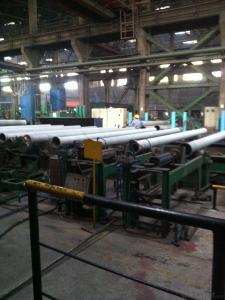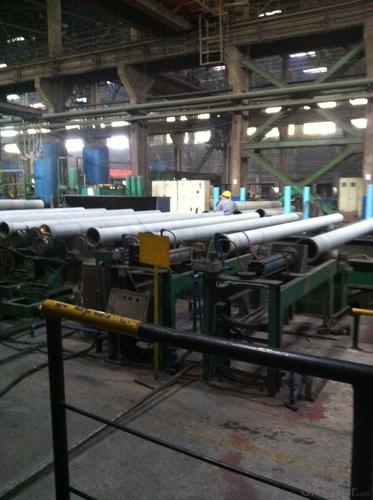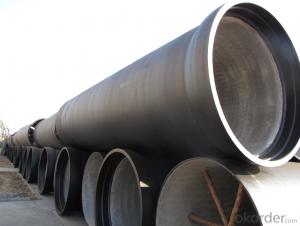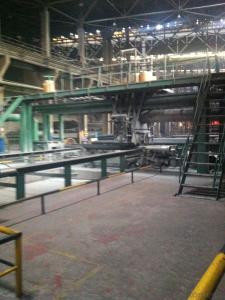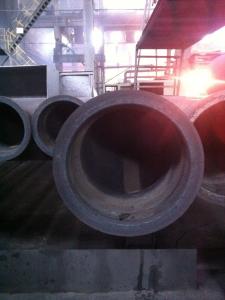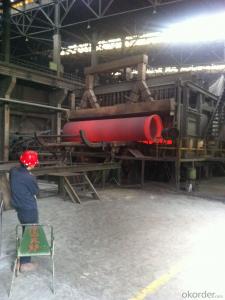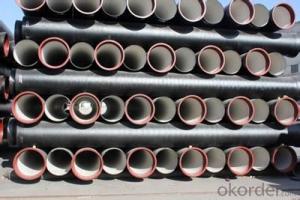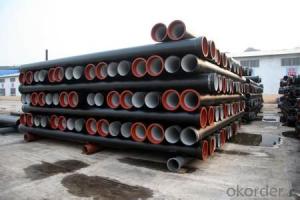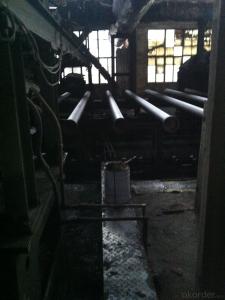DUCTILE IRON PIPES AND PIPE FITTINGS K9 CLASS DN800
- Loading Port:
- Tianjin
- Payment Terms:
- TT OR LC
- Min Order Qty:
- 22 pc
- Supply Capability:
- 3000 pc/month
OKorder Service Pledge
OKorder Financial Service
You Might Also Like
Material : Ductile Cast Iron
Size Range : DN 80mm to DN 2000mm
Unit Effective Length : 6m or 5.7m
Manufacture Standard: ISO 2531:1998/ EN 545:2006/EN 598:2007
Annual capacity : 200,000 tons
Coating Exterior: Zinc 130g/m2 according to ISO 8179-1 and bitumen coating 70 microns.
Cement Interior: Portland Cement/ High Alumina Cement/ Sulphate Resisting Cement Lining according to ISO 4179
Special requirements on external coating and internal lining can be applied
We also provide accessories such as SBR/EPDM rubber gaskets, lubricant paste, pipe caps, PE sleeves, etc.
Additional Parts:
Each pipe is strictly inspected according to related standard to ensure permanently high performance.
Easy Installation at site and service free for life
Long Service Lifespan
Quotation will arrive you within 24hours once we get your inquiry.
We guarantee offering you a competitive price.
A copy of original inspection reports of pipes will be offered after shipment.
Photos of loading process will be sent to the customer after shipment effect.
We will follow-up the delivery progress after shipment effect and update to the customer on weekly basis.
- Q: How do ductile iron pipes perform in high-temperature water applications?
- Ductile iron pipes possess remarkable strength, durability, and exceptional mechanical properties, rendering them suitable for diverse applications. However, certain factors must be taken into consideration when utilizing them in high-temperature water scenarios. Typically, ductile iron pipes exhibit satisfactory performance in high-temperature water settings up to a specific threshold. The exact temperature constraint hinges on the particular grade of ductile iron employed and the duration of exposure to elevated temperatures. Generally, ductile iron pipes can endure temperatures ranging from 350 to 400 degrees Fahrenheit for brief periods without suffering significant deterioration or loss of strength. Nevertheless, it is crucial to acknowledge that prolonged exposure to high temperatures can have adverse effects on ductile iron pipes. When subjected to elevated temperatures, these pipes may undergo thermal degradation, which can result in diminished mechanical properties, heightened brittleness, and even eventual cracking or failure. To mitigate the risks associated with high-temperature water applications, several precautionary measures can be implemented. Firstly, selecting a suitable grade of ductile iron with an elevated temperature tolerance can enhance the pipes' performance. Secondly, incorporating adequate insulation or heat shielding measures can minimize direct heat transfer to the pipes, thereby reducing the likelihood of thermal degradation. Furthermore, frequent monitoring and maintenance of ductile iron pipes utilized in high-temperature water settings are crucial to promptly identify any indications of degradation or damage and take appropriate remedial actions to prevent failure. In conclusion, although ductile iron pipes typically perform well in high-temperature water applications, it is imperative to thoroughly evaluate the specific conditions and requirements of the application to ensure their sustained performance and integrity.
- Q: What is cast iron pipe?
- According to its manufacturing methods can be divided into: sand, centrifugal pipe, straight pipe, continuous cast iron pipe and sand pipe.According to the material used, it can be divided into gray iron pipe, nodular cast iron pipe and high silicon iron pipe.
- Q: What is the relationship between continuous cast iron pipe and ductile iron pipe?
- In general, the continuous cast iron pipe is the continuous casting of gray cast iron pipe, while the centrifugal cast iron pipe is centrifugal ductile iron pipe. Of course, you have to be hard, just to make continuous ductile iron pipes, that's what you want.
- Q: When the ductile iron pipe is pressed, the three links are always running out. What should be done?
- If the conventional backfill soil pressure, pipe fittings installed properly, the phenomenon will not appear.
- Q: Are ductile iron pipes resistant to biogenic sulfide corrosion?
- Ductile iron pipes are known for their general resistance to biogenic sulfide corrosion. Biogenic sulfide corrosion is caused by the reaction between hydrogen sulfide gas, which is produced when organic matter decays, and metallic surfaces. However, ductile iron pipes have a protective layer called the cement mortar lining, which acts as a barrier against corrosive agents. This lining effectively resists the corrosive effects of biogenic sulfide, making ductile iron pipes a suitable choice for applications where this type of corrosion is a concern. In addition, the strength and durability of ductile iron pipes further contribute to their ability to resist biogenic sulfide corrosion.
- Q: What's the advantage of FCD50 ductile iron?
- Ductile cast iron pipes are called ductile iron pipes.
- Q: Are ductile iron pipes resistant to microbiologically induced corrosion?
- Yes, ductile iron pipes are highly resistant to microbiologically induced corrosion. The unique composition and structure of ductile iron make it less susceptible to the growth of microorganisms and the subsequent corrosion caused by them. Additionally, the protective oxide layer that forms naturally on the surface of ductile iron pipes provides an extra layer of defense against microbiological corrosion.
- Q: How is ductile iron pipe recycled?
- Ductile iron pipe is a highly durable and long-lasting material used in various infrastructure systems such as water and wastewater pipelines. When it reaches the end of its life cycle, ductile iron pipe can be recycled rather than disposed of in landfills. The process of recycling ductile iron pipe begins with its removal from the ground. Typically, a trench is dug to access the pipe, and it is cut into smaller, manageable sections using specialized equipment. These sections are then transported to a recycling facility. At the recycling facility, the ductile iron pipe is further processed to remove any contaminants. This involves removing any fittings or joints that may be attached to the pipe. Any non-iron materials, such as rubber gaskets or coatings, are also separated and discarded. Once the pipe has been cleaned and prepared, it is usually crushed or shredded into smaller pieces. This step increases the surface area of the material, making it easier to melt down in the next stage of the recycling process. The crushed or shredded ductile iron pipe is then melted in a furnace at high temperatures. This process, known as smelting, converts the solid iron into a liquid state. During smelting, impurities and any remaining non-iron materials rise to the surface and are skimmed off. After smelting, the molten iron is poured into molds to form new products. These molds can be used to produce a wide range of ductile iron products, including new pipes, fittings, valves, and manhole covers. The new products made from recycled ductile iron pipe have the same qualities and durability as those made from virgin materials. Recycling ductile iron pipe not only reduces the demand for new materials but also helps conserve energy and resources. The process requires less energy compared to producing iron from raw materials, which results in a lower carbon footprint. Additionally, recycling ductile iron pipe helps to reduce waste and promotes a circular economy by giving new life to an otherwise discarded material.
- Q: How do ductile iron pipes handle water hammer?
- Ductile iron pipes are well-suited to handle water hammer due to their inherent strength and flexibility. The high tensile strength of ductile iron helps absorb and dampen the pressure surges caused by water hammer, preventing any significant damage to the pipes. Additionally, the inherent ductility of these pipes allows them to flex and absorb the impact of water hammer, reducing the likelihood of cracks or bursts. Overall, ductile iron pipes provide a reliable and durable solution for managing water hammer in water distribution systems.
- Q: Are there any limitations to the length of ductile iron pipe sections?
- Limitations exist regarding the length of ductile iron pipe sections. Typically, these limitations stem from practical concerns such as transportation, installation, and handling. Longer pipe sections can present difficulties when it comes to transportation and maneuverability, particularly in areas with limited access or challenging terrain. Moreover, longer pipe sections may be more susceptible to damage during installation since proper alignment and joining can be more challenging. Manufacturing capabilities also impose limitations. Ductile iron pipes are typically produced in standard lengths, which can vary depending on the manufacturer and the specific application. These standard lengths are designed to strike a balance between transportation, installation, and overall pipe performance. In addition, longer pipe sections may pose challenges related to temperature variations and subsequent expansion and contraction. Ductile iron pipes are prone to thermal expansion and contraction, and longer sections may experience greater stress and strain as a result. Therefore, while there is no definitive maximum length for ductile iron pipe sections, practical considerations and manufacturing capabilities dictate the use of standard lengths that consider various factors such as transportation, installation, and performance.
Send your message to us
DUCTILE IRON PIPES AND PIPE FITTINGS K9 CLASS DN800
- Loading Port:
- Tianjin
- Payment Terms:
- TT OR LC
- Min Order Qty:
- 22 pc
- Supply Capability:
- 3000 pc/month
OKorder Service Pledge
OKorder Financial Service
Similar products
Hot products
Hot Searches
Related keywords
